HRO Principles: Research on Improving Healthcare Services Quality
VerifiedAdded on 2023/06/12
|8
|1413
|151
Report
AI Summary
This research proposal explores the application of High Reliability Organization (HRO) principles in improving healthcare services. The aim is to identify the specific principles used by HROs to enhance healthcare, focusing on their role in healthcare settings and the challenges they face. The study employs a qualitative research method, utilizing secondary sources such as books, journals, and articles to gather data. It anticipates demonstrating the importance of HROs in reducing errors and improving patient safety within hospitals, highlighting the significance of qualitative research in systematically analyzing data. The expected outcome emphasizes the detailed information provided about HRO principles and their potential benefits for healthcare professionals, researchers, and the overall healthcare system by improving clinical outcomes and managing clinical costs.
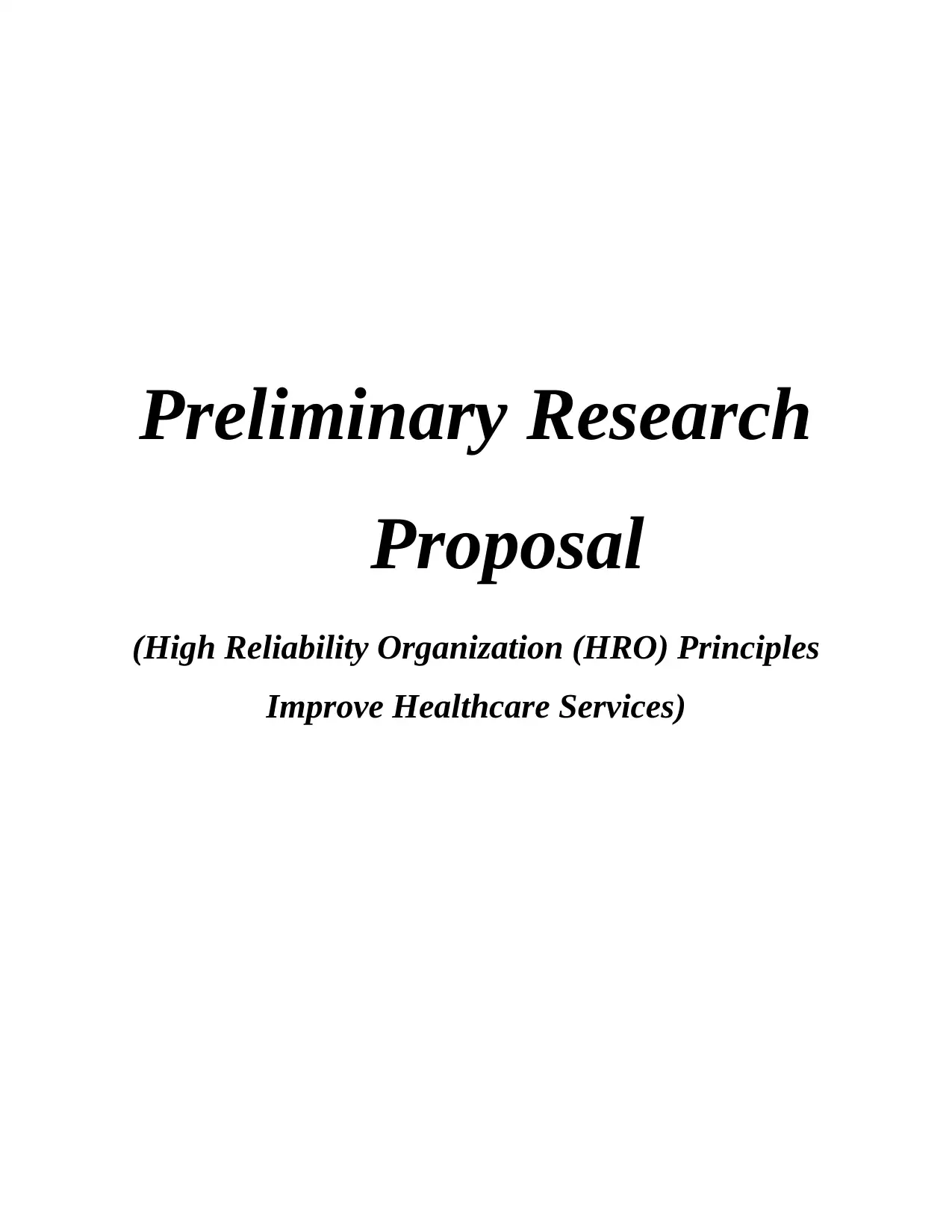
Preliminary Research
Proposal
(High Reliability Organization (HRO) Principles
Improve Healthcare Services)
Proposal
(High Reliability Organization (HRO) Principles
Improve Healthcare Services)
Paraphrase This Document
Need a fresh take? Get an instant paraphrase of this document with our AI Paraphraser
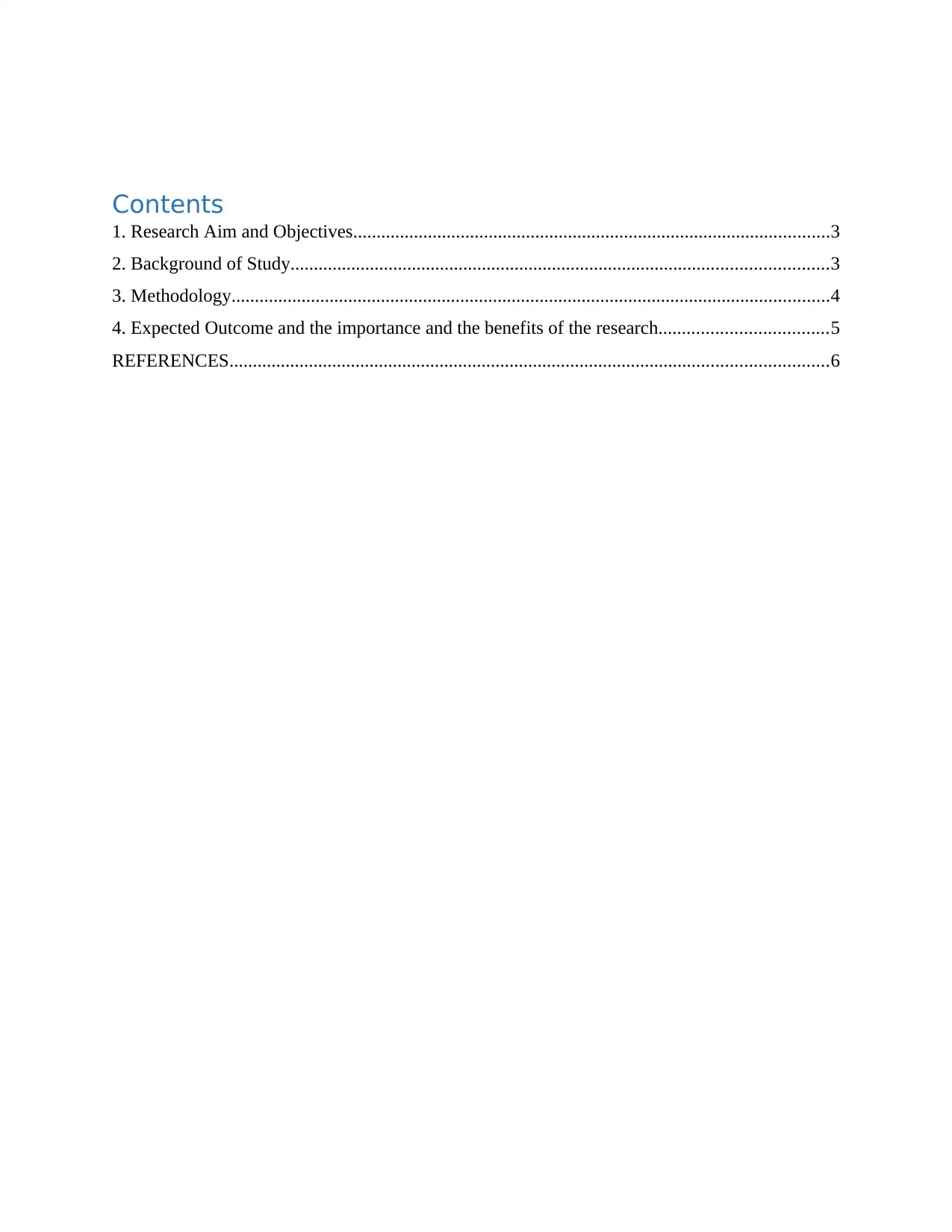
Contents
1. Research Aim and Objectives......................................................................................................3
2. Background of Study...................................................................................................................3
3. Methodology................................................................................................................................4
4. Expected Outcome and the importance and the benefits of the research....................................5
REFERENCES................................................................................................................................6
1. Research Aim and Objectives......................................................................................................3
2. Background of Study...................................................................................................................3
3. Methodology................................................................................................................................4
4. Expected Outcome and the importance and the benefits of the research....................................5
REFERENCES................................................................................................................................6
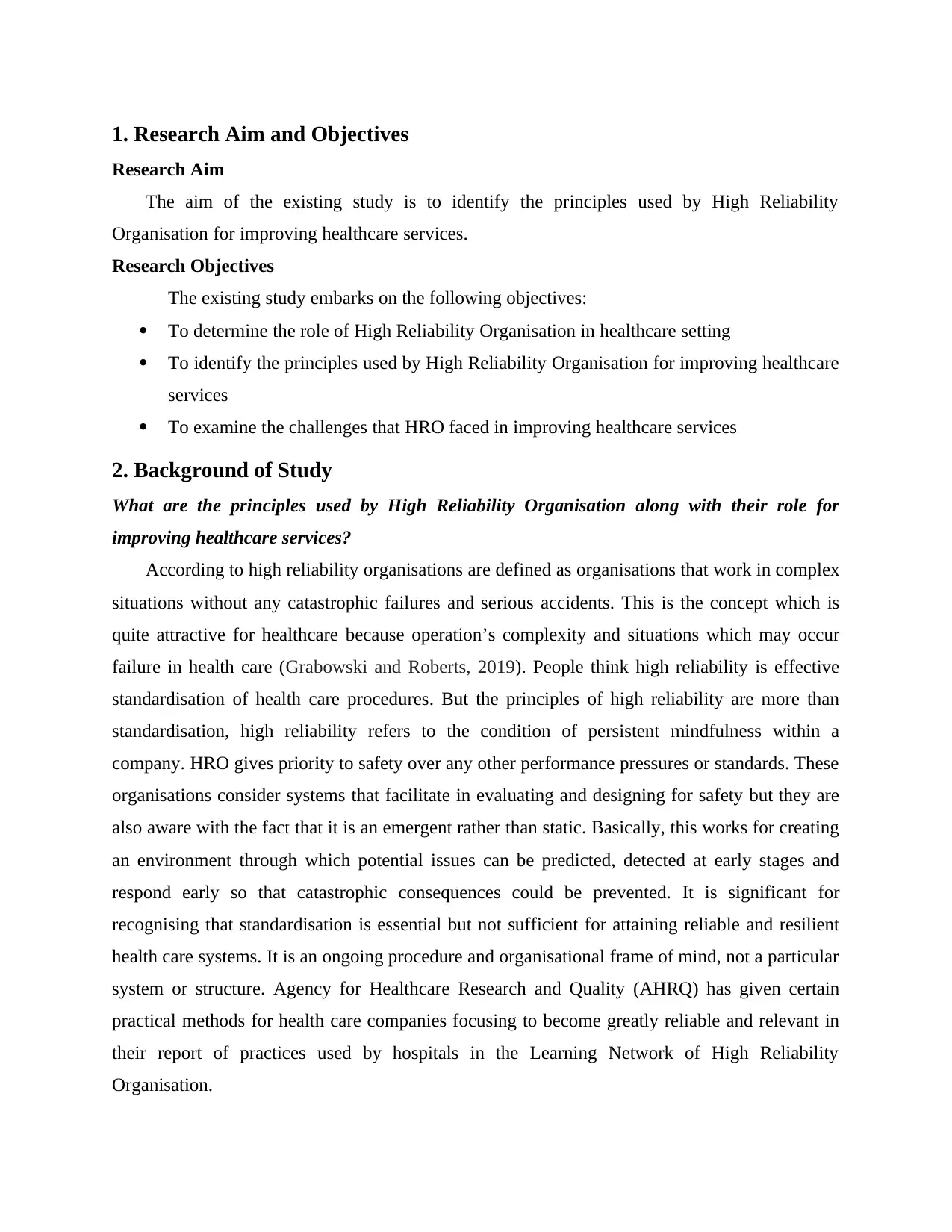
1. Research Aim and Objectives
Research Aim
The aim of the existing study is to identify the principles used by High Reliability
Organisation for improving healthcare services.
Research Objectives
The existing study embarks on the following objectives:
To determine the role of High Reliability Organisation in healthcare setting
To identify the principles used by High Reliability Organisation for improving healthcare
services
To examine the challenges that HRO faced in improving healthcare services
2. Background of Study
What are the principles used by High Reliability Organisation along with their role for
improving healthcare services?
According to high reliability organisations are defined as organisations that work in complex
situations without any catastrophic failures and serious accidents. This is the concept which is
quite attractive for healthcare because operation’s complexity and situations which may occur
failure in health care (Grabowski and Roberts, 2019). People think high reliability is effective
standardisation of health care procedures. But the principles of high reliability are more than
standardisation, high reliability refers to the condition of persistent mindfulness within a
company. HRO gives priority to safety over any other performance pressures or standards. These
organisations consider systems that facilitate in evaluating and designing for safety but they are
also aware with the fact that it is an emergent rather than static. Basically, this works for creating
an environment through which potential issues can be predicted, detected at early stages and
respond early so that catastrophic consequences could be prevented. It is significant for
recognising that standardisation is essential but not sufficient for attaining reliable and resilient
health care systems. It is an ongoing procedure and organisational frame of mind, not a particular
system or structure. Agency for Healthcare Research and Quality (AHRQ) has given certain
practical methods for health care companies focusing to become greatly reliable and relevant in
their report of practices used by hospitals in the Learning Network of High Reliability
Organisation.
Research Aim
The aim of the existing study is to identify the principles used by High Reliability
Organisation for improving healthcare services.
Research Objectives
The existing study embarks on the following objectives:
To determine the role of High Reliability Organisation in healthcare setting
To identify the principles used by High Reliability Organisation for improving healthcare
services
To examine the challenges that HRO faced in improving healthcare services
2. Background of Study
What are the principles used by High Reliability Organisation along with their role for
improving healthcare services?
According to high reliability organisations are defined as organisations that work in complex
situations without any catastrophic failures and serious accidents. This is the concept which is
quite attractive for healthcare because operation’s complexity and situations which may occur
failure in health care (Grabowski and Roberts, 2019). People think high reliability is effective
standardisation of health care procedures. But the principles of high reliability are more than
standardisation, high reliability refers to the condition of persistent mindfulness within a
company. HRO gives priority to safety over any other performance pressures or standards. These
organisations consider systems that facilitate in evaluating and designing for safety but they are
also aware with the fact that it is an emergent rather than static. Basically, this works for creating
an environment through which potential issues can be predicted, detected at early stages and
respond early so that catastrophic consequences could be prevented. It is significant for
recognising that standardisation is essential but not sufficient for attaining reliable and resilient
health care systems. It is an ongoing procedure and organisational frame of mind, not a particular
system or structure. Agency for Healthcare Research and Quality (AHRQ) has given certain
practical methods for health care companies focusing to become greatly reliable and relevant in
their report of practices used by hospitals in the Learning Network of High Reliability
Organisation.
⊘ This is a preview!⊘
Do you want full access?
Subscribe today to unlock all pages.

Trusted by 1+ million students worldwide
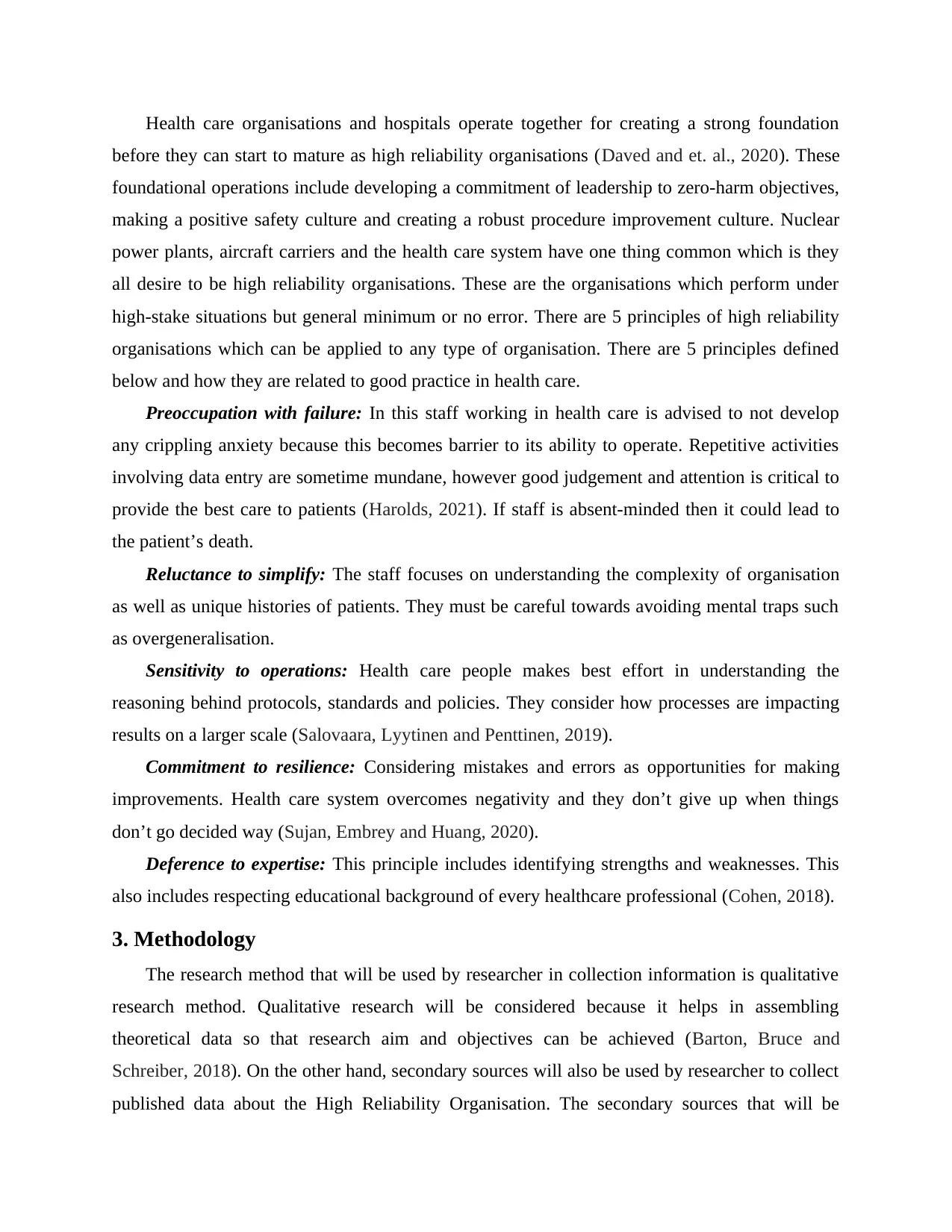
Health care organisations and hospitals operate together for creating a strong foundation
before they can start to mature as high reliability organisations (Daved and et. al., 2020). These
foundational operations include developing a commitment of leadership to zero-harm objectives,
making a positive safety culture and creating a robust procedure improvement culture. Nuclear
power plants, aircraft carriers and the health care system have one thing common which is they
all desire to be high reliability organisations. These are the organisations which perform under
high-stake situations but general minimum or no error. There are 5 principles of high reliability
organisations which can be applied to any type of organisation. There are 5 principles defined
below and how they are related to good practice in health care.
Preoccupation with failure: In this staff working in health care is advised to not develop
any crippling anxiety because this becomes barrier to its ability to operate. Repetitive activities
involving data entry are sometime mundane, however good judgement and attention is critical to
provide the best care to patients (Harolds, 2021). If staff is absent-minded then it could lead to
the patient’s death.
Reluctance to simplify: The staff focuses on understanding the complexity of organisation
as well as unique histories of patients. They must be careful towards avoiding mental traps such
as overgeneralisation.
Sensitivity to operations: Health care people makes best effort in understanding the
reasoning behind protocols, standards and policies. They consider how processes are impacting
results on a larger scale (Salovaara, Lyytinen and Penttinen, 2019).
Commitment to resilience: Considering mistakes and errors as opportunities for making
improvements. Health care system overcomes negativity and they don’t give up when things
don’t go decided way (Sujan, Embrey and Huang, 2020).
Deference to expertise: This principle includes identifying strengths and weaknesses. This
also includes respecting educational background of every healthcare professional (Cohen, 2018).
3. Methodology
The research method that will be used by researcher in collection information is qualitative
research method. Qualitative research will be considered because it helps in assembling
theoretical data so that research aim and objectives can be achieved (Barton, Bruce and
Schreiber, 2018). On the other hand, secondary sources will also be used by researcher to collect
published data about the High Reliability Organisation. The secondary sources that will be
before they can start to mature as high reliability organisations (Daved and et. al., 2020). These
foundational operations include developing a commitment of leadership to zero-harm objectives,
making a positive safety culture and creating a robust procedure improvement culture. Nuclear
power plants, aircraft carriers and the health care system have one thing common which is they
all desire to be high reliability organisations. These are the organisations which perform under
high-stake situations but general minimum or no error. There are 5 principles of high reliability
organisations which can be applied to any type of organisation. There are 5 principles defined
below and how they are related to good practice in health care.
Preoccupation with failure: In this staff working in health care is advised to not develop
any crippling anxiety because this becomes barrier to its ability to operate. Repetitive activities
involving data entry are sometime mundane, however good judgement and attention is critical to
provide the best care to patients (Harolds, 2021). If staff is absent-minded then it could lead to
the patient’s death.
Reluctance to simplify: The staff focuses on understanding the complexity of organisation
as well as unique histories of patients. They must be careful towards avoiding mental traps such
as overgeneralisation.
Sensitivity to operations: Health care people makes best effort in understanding the
reasoning behind protocols, standards and policies. They consider how processes are impacting
results on a larger scale (Salovaara, Lyytinen and Penttinen, 2019).
Commitment to resilience: Considering mistakes and errors as opportunities for making
improvements. Health care system overcomes negativity and they don’t give up when things
don’t go decided way (Sujan, Embrey and Huang, 2020).
Deference to expertise: This principle includes identifying strengths and weaknesses. This
also includes respecting educational background of every healthcare professional (Cohen, 2018).
3. Methodology
The research method that will be used by researcher in collection information is qualitative
research method. Qualitative research will be considered because it helps in assembling
theoretical data so that research aim and objectives can be achieved (Barton, Bruce and
Schreiber, 2018). On the other hand, secondary sources will also be used by researcher to collect
published data about the High Reliability Organisation. The secondary sources that will be
Paraphrase This Document
Need a fresh take? Get an instant paraphrase of this document with our AI Paraphraser
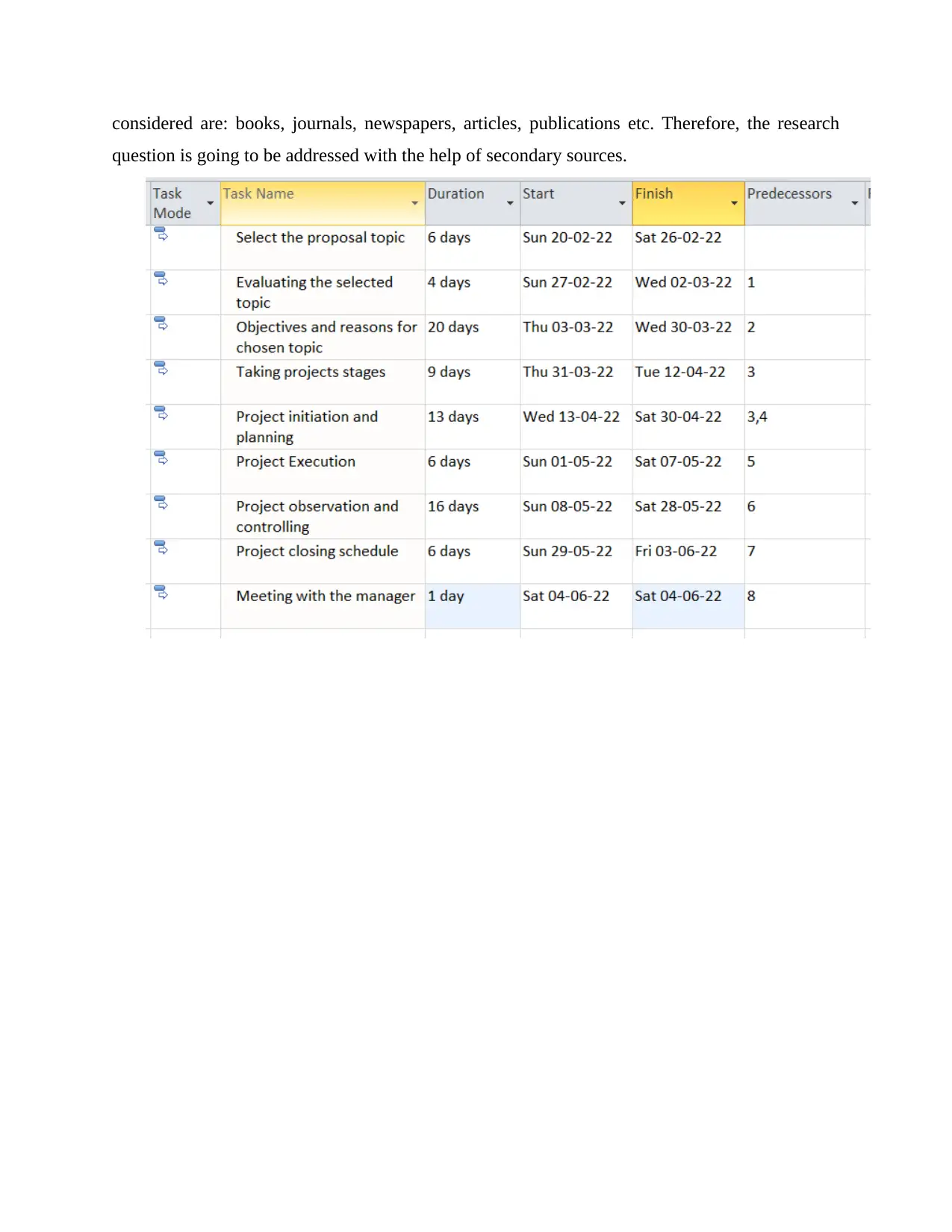
considered are: books, journals, newspapers, articles, publications etc. Therefore, the research
question is going to be addressed with the help of secondary sources.
question is going to be addressed with the help of secondary sources.
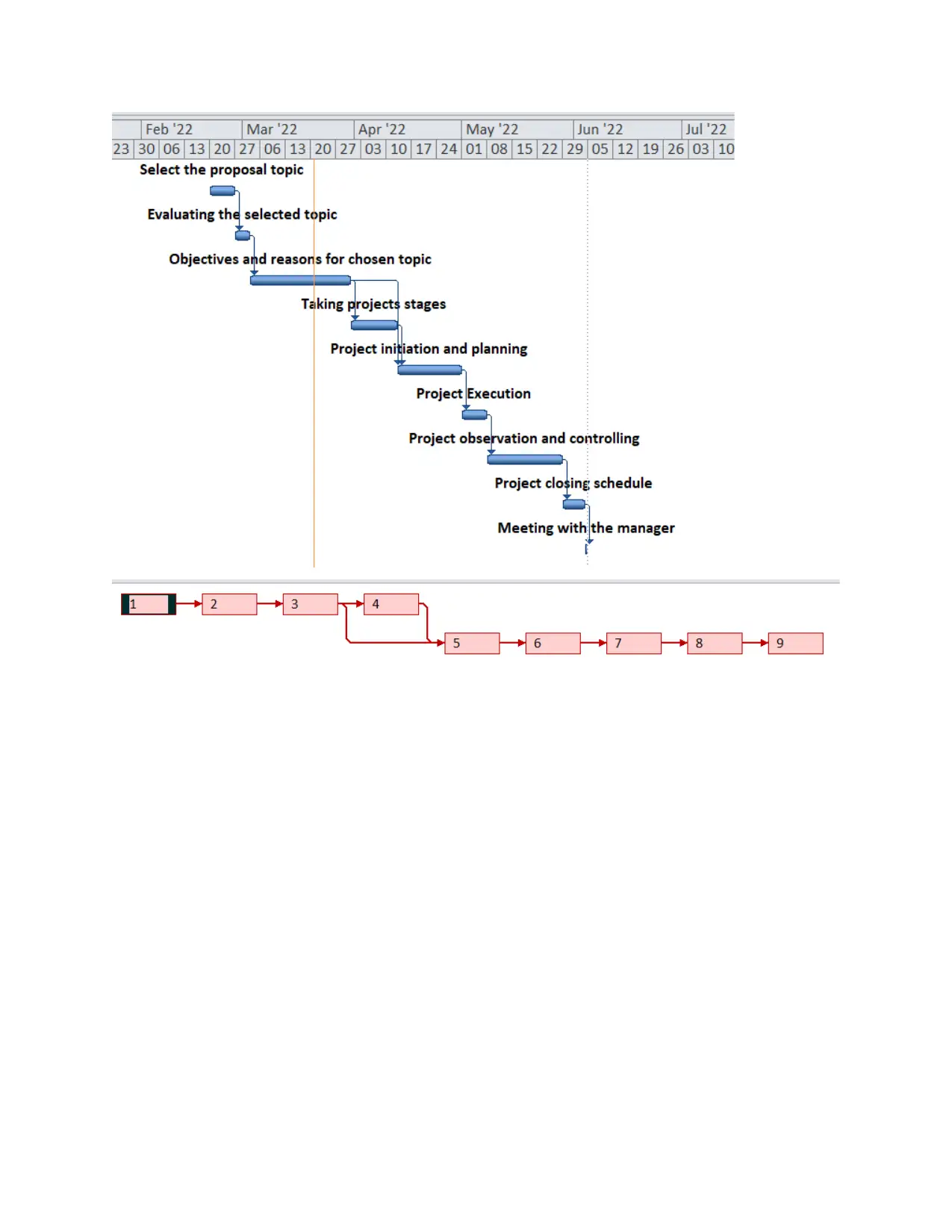
⊘ This is a preview!⊘
Do you want full access?
Subscribe today to unlock all pages.

Trusted by 1+ million students worldwide
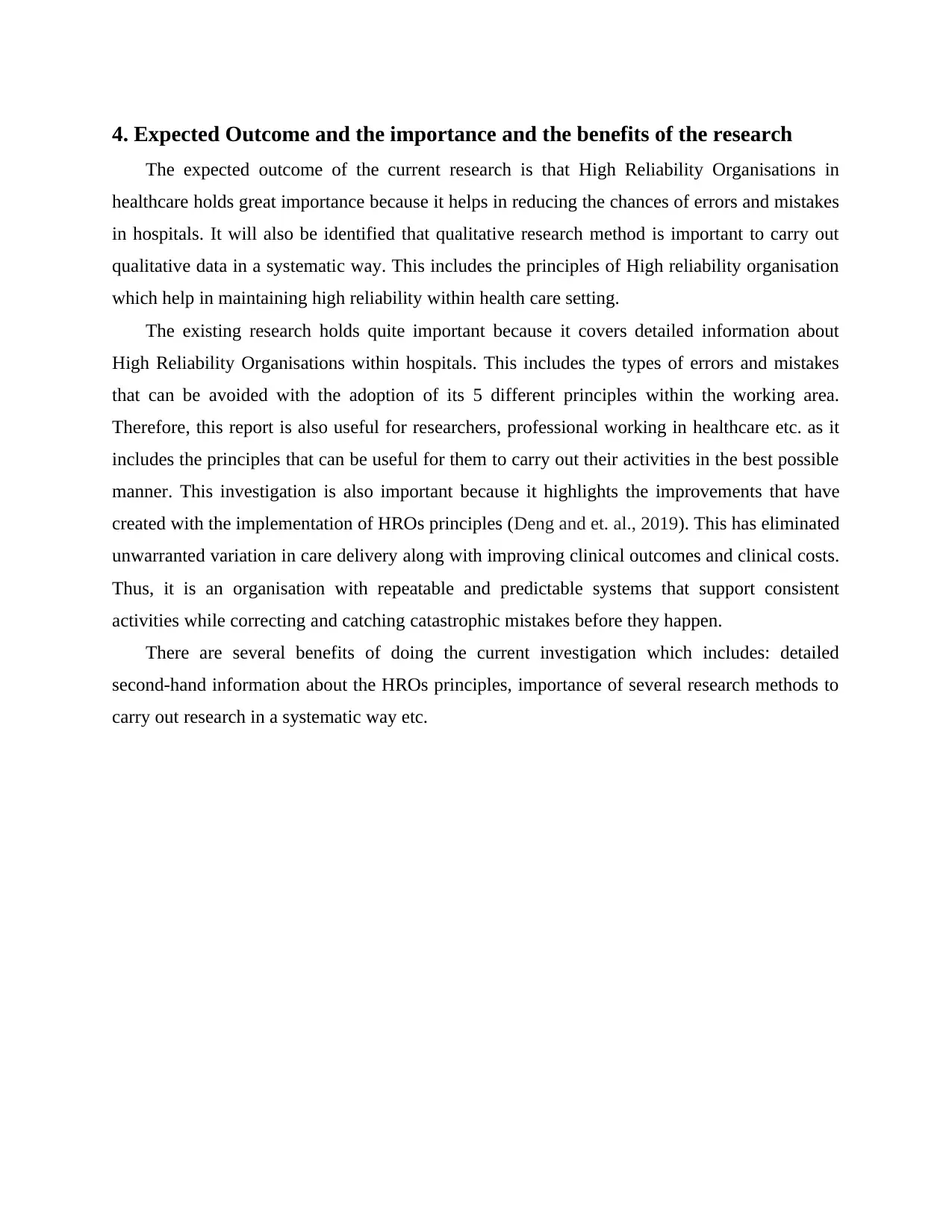
4. Expected Outcome and the importance and the benefits of the research
The expected outcome of the current research is that High Reliability Organisations in
healthcare holds great importance because it helps in reducing the chances of errors and mistakes
in hospitals. It will also be identified that qualitative research method is important to carry out
qualitative data in a systematic way. This includes the principles of High reliability organisation
which help in maintaining high reliability within health care setting.
The existing research holds quite important because it covers detailed information about
High Reliability Organisations within hospitals. This includes the types of errors and mistakes
that can be avoided with the adoption of its 5 different principles within the working area.
Therefore, this report is also useful for researchers, professional working in healthcare etc. as it
includes the principles that can be useful for them to carry out their activities in the best possible
manner. This investigation is also important because it highlights the improvements that have
created with the implementation of HROs principles (Deng and et. al., 2019). This has eliminated
unwarranted variation in care delivery along with improving clinical outcomes and clinical costs.
Thus, it is an organisation with repeatable and predictable systems that support consistent
activities while correcting and catching catastrophic mistakes before they happen.
There are several benefits of doing the current investigation which includes: detailed
second-hand information about the HROs principles, importance of several research methods to
carry out research in a systematic way etc.
The expected outcome of the current research is that High Reliability Organisations in
healthcare holds great importance because it helps in reducing the chances of errors and mistakes
in hospitals. It will also be identified that qualitative research method is important to carry out
qualitative data in a systematic way. This includes the principles of High reliability organisation
which help in maintaining high reliability within health care setting.
The existing research holds quite important because it covers detailed information about
High Reliability Organisations within hospitals. This includes the types of errors and mistakes
that can be avoided with the adoption of its 5 different principles within the working area.
Therefore, this report is also useful for researchers, professional working in healthcare etc. as it
includes the principles that can be useful for them to carry out their activities in the best possible
manner. This investigation is also important because it highlights the improvements that have
created with the implementation of HROs principles (Deng and et. al., 2019). This has eliminated
unwarranted variation in care delivery along with improving clinical outcomes and clinical costs.
Thus, it is an organisation with repeatable and predictable systems that support consistent
activities while correcting and catching catastrophic mistakes before they happen.
There are several benefits of doing the current investigation which includes: detailed
second-hand information about the HROs principles, importance of several research methods to
carry out research in a systematic way etc.
Paraphrase This Document
Need a fresh take? Get an instant paraphrase of this document with our AI Paraphraser
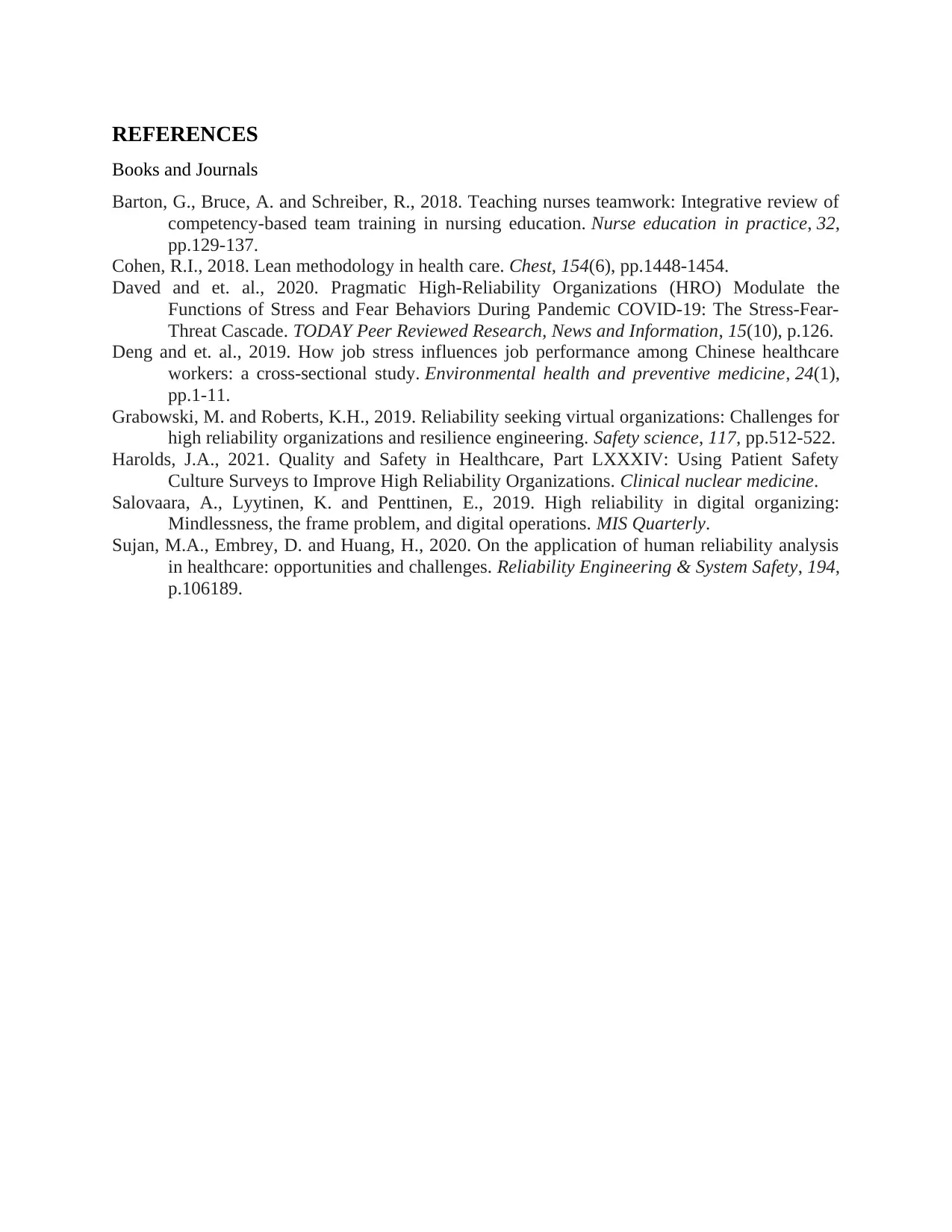
REFERENCES
Books and Journals
Barton, G., Bruce, A. and Schreiber, R., 2018. Teaching nurses teamwork: Integrative review of
competency-based team training in nursing education. Nurse education in practice, 32,
pp.129-137.
Cohen, R.I., 2018. Lean methodology in health care. Chest, 154(6), pp.1448-1454.
Daved and et. al., 2020. Pragmatic High-Reliability Organizations (HRO) Modulate the
Functions of Stress and Fear Behaviors During Pandemic COVID-19: The Stress-Fear-
Threat Cascade. TODAY Peer Reviewed Research, News and Information, 15(10), p.126.
Deng and et. al., 2019. How job stress influences job performance among Chinese healthcare
workers: a cross-sectional study. Environmental health and preventive medicine, 24(1),
pp.1-11.
Grabowski, M. and Roberts, K.H., 2019. Reliability seeking virtual organizations: Challenges for
high reliability organizations and resilience engineering. Safety science, 117, pp.512-522.
Harolds, J.A., 2021. Quality and Safety in Healthcare, Part LXXXIV: Using Patient Safety
Culture Surveys to Improve High Reliability Organizations. Clinical nuclear medicine.
Salovaara, A., Lyytinen, K. and Penttinen, E., 2019. High reliability in digital organizing:
Mindlessness, the frame problem, and digital operations. MIS Quarterly.
Sujan, M.A., Embrey, D. and Huang, H., 2020. On the application of human reliability analysis
in healthcare: opportunities and challenges. Reliability Engineering & System Safety, 194,
p.106189.
Books and Journals
Barton, G., Bruce, A. and Schreiber, R., 2018. Teaching nurses teamwork: Integrative review of
competency-based team training in nursing education. Nurse education in practice, 32,
pp.129-137.
Cohen, R.I., 2018. Lean methodology in health care. Chest, 154(6), pp.1448-1454.
Daved and et. al., 2020. Pragmatic High-Reliability Organizations (HRO) Modulate the
Functions of Stress and Fear Behaviors During Pandemic COVID-19: The Stress-Fear-
Threat Cascade. TODAY Peer Reviewed Research, News and Information, 15(10), p.126.
Deng and et. al., 2019. How job stress influences job performance among Chinese healthcare
workers: a cross-sectional study. Environmental health and preventive medicine, 24(1),
pp.1-11.
Grabowski, M. and Roberts, K.H., 2019. Reliability seeking virtual organizations: Challenges for
high reliability organizations and resilience engineering. Safety science, 117, pp.512-522.
Harolds, J.A., 2021. Quality and Safety in Healthcare, Part LXXXIV: Using Patient Safety
Culture Surveys to Improve High Reliability Organizations. Clinical nuclear medicine.
Salovaara, A., Lyytinen, K. and Penttinen, E., 2019. High reliability in digital organizing:
Mindlessness, the frame problem, and digital operations. MIS Quarterly.
Sujan, M.A., Embrey, D. and Huang, H., 2020. On the application of human reliability analysis
in healthcare: opportunities and challenges. Reliability Engineering & System Safety, 194,
p.106189.
1 out of 8